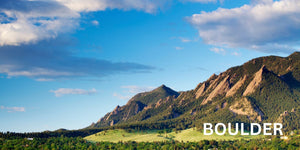3 Tips To Avoid Boulder Altitude Sickness

If you're planning to visit Boulder Colorado, many are taken back that you can get altitude sickness. We know best living in Colorado, and we'll share with all about Boulder's altitude and three tips to avoid Boulder altitude sickness.
Boulder Altitude
Boulder altitude sits at 5,430 feet high above sea level. That's slightly higher than Denver's altitude and higher than most other cities in the front range of Colorado.
- Boulder altitude - 5,430 ft (1,655 m)
With such high Boulder altitude, you run the risk of altitude sickness, especially if visiting from sea level.
Boulder Things To Do
Located just to the north of Denver, Boulder is known for its mountain scenery, outdoor activities, and vibrant food and health scene. You'll find an abundance of outdoor activities and attractions in Boulder, including hiking, biking and climbing.
Popular for so many reasons, many visitors will visit its famous downtown Pearl Street or explore its many outdoor areas as it Boulder sits at the edge of the Rocky Mountains — including Flatirons, Eldorado Canyon State Park, Boulder Reservoir, Flagstaff Mountain, and Green Mountain.
Boulder Altitude Sickness
With Boulder sitting at an altitude of 5,430 feet above sea level — it's higher than most major cities in America. That's a lot of altitude to acclimate to if you're not used to high elevation.
Altitude sickness can happen when you go to higher elevations quickly due to the lower oxygen levels. Without proper preparation and giving your body time to adjust, mild Boulder altitude sickness symptoms may happen at any moment, especially during your first few days of visiting.
Symptoms of Boulder altitude sickness may include:
- Headache
- Nausea or vomiting
- Fatigue or tiredness
- Weakness
- Trouble breathing
- Loss of appetite
- Dizziness
- Difficulty sleeping or insomnia
It's best to properly prepare to best avoid Boulder's altitude sickness, we'll go over our best tips below.
3 Tips To Avoid Boulder Altitude Sickness
While Boulder Colorado is known for its breathtaking scenery and natural beauty, many underestimate the risk of getting altitude sickness.
Being based out of Colorado, we know altitude very well. From acclimatization to supplements for high altitude, we'll cover the essential tips for you to avoid Boulder altitude sickness.
Here are 3 tips to help avoid Boulder altitude sickness:
1. Proper Hydration
The first step to avoiding altitude sickness is proper hydration.
While this tip might seem like a no-brainer, most people visiting Colorado don't realize they're dehydrated. With the high altitude and dry climate, it's a recipe for faster loss of body fluids. The high altitude in Boulder also causes increase respiration which further leads to dehydration.
At a minimum, you should drink at least half your body weight in ounces of water. 1 ounce per every 2 pounds. That’s a good start, but if you’re planning on activities like climbing mountains and hiking in Boulder, you need even more water.
Make sure to start drinking ample water not only every day of your visit, but days leading up to your trip too.
TIP: To maximize hydration, you can either add sea salt to your drinks or take Zaca's
chewable electrolyte tablets that help increase water absorption and electrolyte intake.
2. Rest & Acclimate
Getting rest and taking it easy for your body to acclimate at Boulder's high elevation is key.
This allows your body to adjust to the changing environment where there's less oxygen. It also gives you time to feel better if you start experiencing symptoms of altitude sickness.
Many visitors overdo it their first day or two, leading to an increase risk in altitude sickness. Avoid any strenuous activities your first few days upon visiting Boulder such as hiking. Get adequate sleep before and each day during your trip so your body has enough time to adjust, recover, and acclimate to the altitude.
Lastly if you're planing on visiting the mountains from Boulder, such as
Breckenridge,
Vail or
Aspen — stay at least 1-3 nights in Boulder before moving on. Many of the mountain towns are over 8,000 feet in altitude, and Boulder is at 5,318 feet. This gives your body a better chance to acclimate in Boulder before beginning a more drastic mountain accent.
3. Take Supplements For High Altitude
To help you pick the best one, in our research we found two ingredients with altitude-based studies:
-
Glutathione - Glutathione is shown in research to be depleted in the body as you go higher in altitude.¹ As the body's master antioxidant, this nutrient is vital to take so that you can replenish lost Glutathione and fight free radical damage from lower oxygen levels.
-
Dihydromyricetin (DHM) - As an Hovenia Dulcis extract, DHM is a flavonoid proven to enhance high altitude performance. It also improved mitochondrial respiration activity.² Whether travelers or athletes, DHM shows evidence to be a vital supplement for altitude sickness.
Using Glutathione and DHM in combination in a supplement can have powerful benefits when encountering Boulder altitude sickness.
In conclusion, follow these top tips to help avoid Boulder altitude sickness — including proper hydration, resting & acclimating, and taking supplements.
Top Altitude Supplement

Designed with both Glutathione and DHM, Zaca chewable tablets are the natural choice for high altitude journeys. With this powerful combination of ingredients you can feel better faster, recover quicker and improve endurance while lowering fatigue. The mountain experience is better when you’re using Zaca. Try Zaca chewable tablets today and feel your best.
SOURCES:
1. Effect of high altitude (7,620 m) exposure on glutathione
https://pubmed.ncbi.nlm.nih.gov/11320641/
2. Dihydromyricetin Improves Physical Performance under Simulated High Altitude
https://journals.lww.com/acsm-msse/fulltext/2014/11000/Dihydromyricetin_Improves_Physical_Performance.6.aspx
3. Boulder Colorado Elevation
https://en.wikipedia.org/wiki/Boulder,_Colorado

